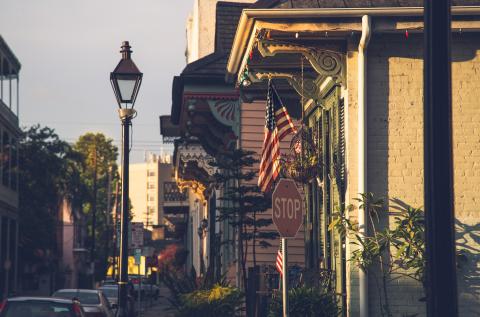Photo by Joe Lavigne on Unsplash
Louisiana Radio Network recently published a conversation with Governor Jeff Landry's longtime political advisor Brent Littlefield, in which he discusses the governor's controversial legislative priority to dismantle the state's nonpartisan electoral system in favor of a party-run system.
Louisiana caught the nation's attention last week when it was announced that the governor wants to end the "jungle primary," in which all voters and qualified candidates participate on a single ballot when other states conduct their general elections and if a candidate gets over 50% of the vote, they win the election outright.
If a candidate does not garner a majority of the votes, a runoff is held the following month.
Landy's announcement was immediately met with opposition from primary reform advocates and prominent elected officials in the state who oppose moving away from a system that has been in place for half-a-century.
It has become a staple in Louisiana politics and is popular with voters. It is so popular in fact that when legislators tried to move to a partisan primary system, voter reaction forced them to go back to the "jungle primary" after two election cycles.
The title of the Louisiana Radio Network piece is "Landry political advisor calls out false narrative against closed party primaries." However, Littlefield doesn't call out a false narrative. Instead, he spreads one of his own using standard partisan talking points to justify the use of closed primary systems.
Claims vs. Reality
Littlefield claims: “It’s only fair that Republicans get to choose a Republican candidate and Democrats get to choose a Democratic candidate. That is a fair way to go and that’s why Governor Landry supports this idea."
The problem with this talking point is the "jungle primary" in place is not about choosing party nominees. It is about electing candidates, regardless of their party.
Under a traditional partisan primary system, publicly-funded and administered primary elections serve the private interest of the Republican and Democratic Parties by picking their nominees for the general election.
Except, despite all taxpayers footing the bill for these elections -- not all can participate.
A nonpartisan electoral structure serves the public interest by giving all candidates and voters the opportunity to participate on a single ballot. All voters decide who they want to fill an elected position by narrowing the field or choosing the candidate outright.
There is nothing that stops the Louisiana Republican Party or the state Democratic Party from hosting private conventions in which they decide which candidates they will support in state and local elections. The parties have a right to do this as private organizations.
Regressing to a partisan primary system, however, is not about party rights. It is about partisan control over the process and electoral outcomes.
Littlefield claims: “To claim that anybody, including independent no-party voters, would be disenfranchised that’s like saying they’re disenfranchised when you vote for president because you’ve had closed primaries for decades in Louisiana for the presidential election."
The definition of "disenfranchise" is to deprive someone of a right -- and most of the time the word is used to discuss the denial of voting rights. Everyone has the right to be treated equally and fairly under the law. This should also apply to election laws.
However, when a state has a closed partisan primary system it extends a privilege to party members that voters outside the parties don't have -- the opportunity to vote in elections that utilize taxpayer-funded assets to have an extra say in electoral outcomes.
This does not treat voters equally under the law. It creates a second-class of voters who want and choose to be registered outside the political parties.
The "jungle primary" allows all voters and qualified candidates to participate on a single ballot. Every voter has an opportunity to choose their preferred option among all candidates running in an election.
In other words, the current system recognizes that all voters have a right to equal participation in elections. Moving to a closed partisan primary would condition this right on joining a private political organization.
It would deprive voters outside the major parties a right recognized under current state law -- which by its very definition is "disenfranchisement."
Littlefield claims: “Until the bill is introduced and until there’s a fiscal note attached to it. We don’t know what the cost is, so it’s disappointing that those people that are being paid to put out that information, and even the news media that is covering it are using figures that are completely pie in the sky,”
The figures Littlefield is referring to are estimations from JMC Analytics and Polling that the move to a partisan primary system would cost the state an extra $90 million over the next decade.
According to former Louisiana State Senator Rick Ward the $90 million figure does not include all the added costs associated with adding new elections. While a bill has not been introduced, a plan to move to a partisan primary system would mean added elections: Elections for the Republican Party and elections for the Democratic Party.
According to the MIT Election Lab, billions are spent on election administration nationwide each major election cycle, with presidential election years being more expensive. This factors in both primaries and general elections.
If you take the lowest figure from the reports studied for a presidential election year, which is approximately $2 billion, that means the average cost per state is $40 million total for election administration.
(Remember, this is the lowest figure, and an average of all 50 states. The price tag varies from state-to-state.)
Even if the $90 million over a decade estimation was off, it likely won't be by much. Either way, it is a steep price taxpayers would have to pay -- especially since a third of them would be denied access to these elections and would essentially be paying for their voting rights to be taken away.
